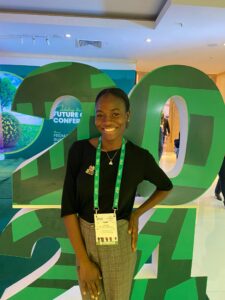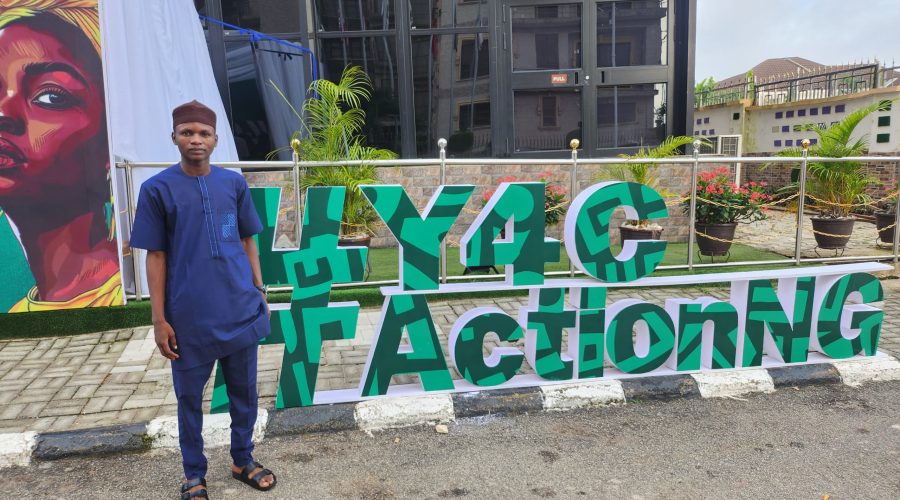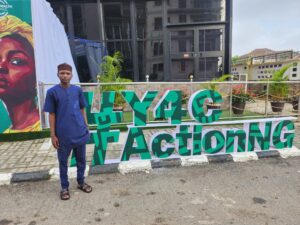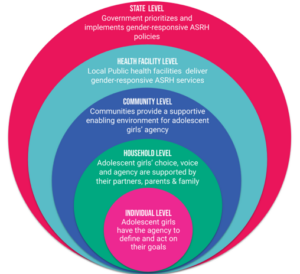Being young does not limit the ability to innovate, construct, and showcase the capacity to drive change and create solutions. For far too long, the youths have, in many instances, been branded with negative stereotypes and thought to be irresponsible, unproductive, and lacking experience. But that is far from reality. Creating an enabling environment for young people to engage in transformative ventures is paramount. In recognition of this, the Society for Family Health collaborated with Nigerian Health Watch to provide a platform for youths to amplify their voices at the Future of Health Conference with a special focus on climate and health nexus.
On October 23rd-24th, 2024, The Youth Pre-Conference and Future of Health Conference were held in Abuja under the themes Amplifying Youth Voices for Climate Action and From Evidence to Action: Building Resilience at the Climate Health Nexus, respectively. As youth innovation officers working with Society for Family Health on the Adolescents 360 project, we had the opportunity to be part of this unforgettable event, and for the first time in our lives! Stepping into this enthralling event, we felt a renewed sense of purpose.
 From observing the other more experienced participants, we realized that we were among the youngest attendees at the conference. It was awe-inspiring to be in the same room with the Honorable Minister of Health and Social Welfare, influential Nigerian leaders, and young climate champions who have initiated impactful projects to mitigate the impacts of climate change. The experience of being in such a space for the first time was surreal. Seeing the perspectives of young people like ourselves being taken seriously was most fulfilling. This experience was more than just a conference, as it was a testament to the power of youth engagement.
From observing the other more experienced participants, we realized that we were among the youngest attendees at the conference. It was awe-inspiring to be in the same room with the Honorable Minister of Health and Social Welfare, influential Nigerian leaders, and young climate champions who have initiated impactful projects to mitigate the impacts of climate change. The experience of being in such a space for the first time was surreal. Seeing the perspectives of young people like ourselves being taken seriously was most fulfilling. This experience was more than just a conference, as it was a testament to the power of youth engagement.
Participating in discussions on climate change and its effect on public health was highly interesting. Climate change is often perceived as a Western problem due to its rapid industrialization and technological advancement. However, its impact is felt worldwide, and it’s time to face up to it.
The event was daunting, as it placed the responsibility squarely on us as the youth to take meaningful action against climate change, regardless of age or status. The young climate change champions stories of starting small and growing big demonstrated the power of grassroots initiatives. Most significantly, this shattered the illusion that change requires a position of power. Additionally, this experience equipped us with the knowledge to harness the power of collaboration to drive change, underscoring that integrity and accountability should be our watchword.
There is a need for multi-sectoral collaboration in promoting climate action and investing in primary healthcare as a basis for resilience to deal with climate changes and cope with emerging challenges to the value chain, creating avenues where responding to climate also creates an economic value – Professor Muhammad Ali Pate.
Reflecting on our experiences at the Youth Pre-Conference and the Future of Health Conference, we were inspired and infused with a strong sense of direction. Climate change poses immense challenges, but so does our potential to effect change as every small action adds up. It is time for young people to rise and amplify their voices and take decisive action. We have the power to shape a better world for our generation. This we will continue to do while utilizing opportunities and platforms created for us, the Society for Family Health, to engage in meaningful conversations that drive development.
The future belongs to us, and our perspectives are vital in shaping policies and actions that affect our world. Climate change is not just an environmental issue; it is a health crisis that demands our attention, and as young people, we are committing to supporting the communities for whom we exist in developing solutions and strategies that prevent the adverse effects of climate change.
By Ashim Catherine Kiyi and Aliyu Abdulazaaz Aliyu
A360 Youth Innovation Officers, Society for Family HealthEdited by: Roselyn Odeh and Ramatu Iyimoga




